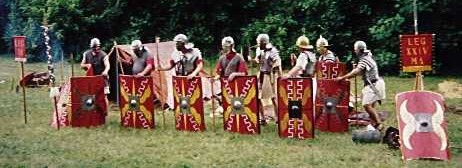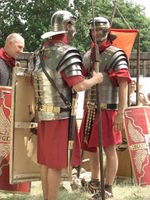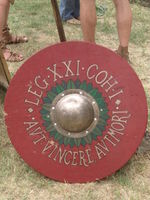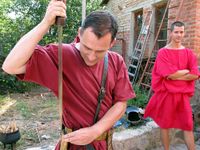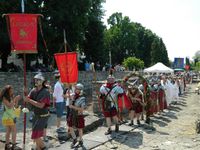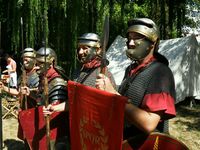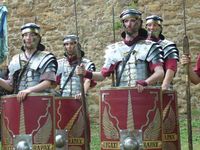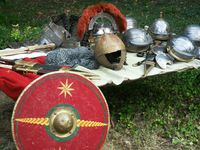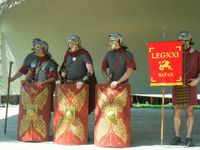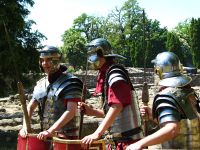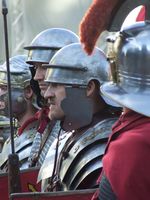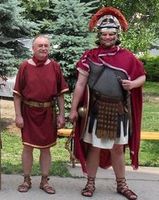Reenactments
m (→Sponsored Legions) |
m (→Sponsored Legions: Duplication erased) |
||
| (2 intermediate revisions by one user not shown) | |||
| Line 1: | Line 1: | ||
<onlyinclude>{{LanguageBar|Reenactments}} | <onlyinclude>{{LanguageBar|Reenactments}} | ||
| + | |||
| + | People from across the world have for decades come together to [[Reenactments|reenact]] historical military and civilian life at various periods in time. A large number of these are dedicated to the Roman era. | ||
| + | |||
| + | Reenactment in Nova Roma takes on its own definition. Many citizens take on a variety of activities, from the use of language, cultural and religious practice, and even military training, as the real thing, not as a pretend scene. In this case it is meant as “revival” and “restoration”. The standard English use of the word “reenactment” does don’t have this same aspect. Every citizen who has an authentic Roman garment falls into this Nova Roman vocabulary definition, whether they participate in public performances or not (real or unreal), and every real (not-pretense) ceremony that is carried out. There really needs to be another word to be more transparent about this activity in Nova Roma. It is unfortunate that the English language chose the word “reenactment” to denote wearing clothes of another period; an issue that does not arise in many other languages. | ||
| + | |||
| + | Take the Hungarian language and the use of their word for “reenactment”, which is “hagyományőrzés”. Its literal translation is “preservation of tradition” or “keeping traditions”. Those in Hungary who practice and participate in these activities have never needed to debate what such definitions mean. Whether a simple legionary or priest, senator or just someone who occasionally participates in Roman events just once in every 5-7 year, they all embrace it and are happy to be labelled as "tradition keepers". | ||
| + | |||
| + | Nova Roma is a living reconstruction, a model Roman state, from top to bottom, a community working, functioning, living according to Roman rules, Roman traditions, including all aspects, like literature, clothing, religion and law. In the ancient Roman state, in order to run for public office as an ''assiduus'' one is required to perform, or at least be available to undertake, military service. It is a requirement in our Nova Roman constitution as well. The Nova Roman military is ceremonial, it's an honor guard with the mission of popularizing Roman history and culture, an educational army. To be as fair as possible to the great variety of citizens, since many people can face several obstacles, physical participation in our educational honor guard legions is not required. If one does it, this is great, but instead of absolving this ancient requirement, a simpler way is offered: it can be substituted with a very small monetary contribution, which in a way does fulfill the sense of “contributing to the legions”. It is also important to keep in mind that it is not obligatory, unless one wants to be an office holder. Ancient Romans had the same requirement, so do we, albeit adapted to our circumstances as a cultural organization. | ||
| + | |||
| + | ==Roman Military Reenactment== | ||
[[Image:Rd line05a.jpg|right|frame|Members of Legio XXIV Media Atlantia in camp.]] | [[Image:Rd line05a.jpg|right|frame|Members of Legio XXIV Media Atlantia in camp.]] | ||
| − | + | As part of our efforts to bring ancient Rome back to life, [[Nova Roma]] sponsors the activities of various legions across the world. The level of historical detail required varies from legion to legion, and some engage in mock combat while others display their prowess at period drill and camp life. Several groups of Roman military reenactors have been approved by [[Senatus Consultum (Nova Roma)|''senatus consultum'']]. Some of these legionary units, like the [[Legio XXI Rapax (Nova Roma)|Legio XXI Rapax]], have been established as our own representative and ceremonial Roman army: join us - we want you! | |
==Sodalitas Militarium== | ==Sodalitas Militarium== | ||
| Line 10: | Line 20: | ||
==Sponsored Legions== | ==Sponsored Legions== | ||
| − | Nova Roma has, from its beginning, sponsored reenactment units throughout the world. Benefits include citizenship, a listing on this page, and web server space. Learn more about the various [[Legiones (Nova Roma)| types and structure of Nova Roma legions | + | Nova Roma has, from its beginning, sponsored reenactment units throughout the world. Benefits include citizenship, a listing on this page, and web server space. Learn more about the various [[Legiones (Nova Roma)| types and structure of Nova Roma legions]]. Find the legions of Nova Roma that we currently sponsor at this link: |
*'''[[Roman Reenactment Army of Nova Roma|List of the legions of Nova Roma]]'''. | *'''[[Roman Reenactment Army of Nova Roma|List of the legions of Nova Roma]]'''. | ||
| Line 50: | Line 60: | ||
* [https://www.ancientrrv.com/ Ancient Roman Reenactors Victoria, (LEGIO X FRETENSIS)] (Melbourne, Australia) | * [https://www.ancientrrv.com/ Ancient Roman Reenactors Victoria, (LEGIO X FRETENSIS)] (Melbourne, Australia) | ||
| + | * [https://www.facebook.com/legioXIIFulminataAU Legio XII Fulminata] (Adelaide, Australia) | ||
* [https://www.gluseum.com/AU/Sydney/797810500428120/Legio-IX-Hispana-Sydney Legio IX Hispana] (Sydney/Blue Mountains, Australia) | * [https://www.gluseum.com/AU/Sydney/797810500428120/Legio-IX-Hispana-Sydney Legio IX Hispana] (Sydney/Blue Mountains, Australia) | ||
* [http://www.sydneyancients.itgo.com/ Sydney Ancients Hoplite & Roman Society] (Sydney, Australia) | * [http://www.sydneyancients.itgo.com/ Sydney Ancients Hoplite & Roman Society] (Sydney, Australia) | ||
Latest revision as of 11:55, 1 January 2026
Home | Latíné | Deutsch | Español | Français | Italiano | Magyar | Português | Română | Русский | English
⚜⚜⚜ Site Index - Key Pages ⚜⚜⚜
People from across the world have for decades come together to reenact historical military and civilian life at various periods in time. A large number of these are dedicated to the Roman era.
Reenactment in Nova Roma takes on its own definition. Many citizens take on a variety of activities, from the use of language, cultural and religious practice, and even military training, as the real thing, not as a pretend scene. In this case it is meant as “revival” and “restoration”. The standard English use of the word “reenactment” does don’t have this same aspect. Every citizen who has an authentic Roman garment falls into this Nova Roman vocabulary definition, whether they participate in public performances or not (real or unreal), and every real (not-pretense) ceremony that is carried out. There really needs to be another word to be more transparent about this activity in Nova Roma. It is unfortunate that the English language chose the word “reenactment” to denote wearing clothes of another period; an issue that does not arise in many other languages.
Take the Hungarian language and the use of their word for “reenactment”, which is “hagyományőrzés”. Its literal translation is “preservation of tradition” or “keeping traditions”. Those in Hungary who practice and participate in these activities have never needed to debate what such definitions mean. Whether a simple legionary or priest, senator or just someone who occasionally participates in Roman events just once in every 5-7 year, they all embrace it and are happy to be labelled as "tradition keepers".
Nova Roma is a living reconstruction, a model Roman state, from top to bottom, a community working, functioning, living according to Roman rules, Roman traditions, including all aspects, like literature, clothing, religion and law. In the ancient Roman state, in order to run for public office as an assiduus one is required to perform, or at least be available to undertake, military service. It is a requirement in our Nova Roman constitution as well. The Nova Roman military is ceremonial, it's an honor guard with the mission of popularizing Roman history and culture, an educational army. To be as fair as possible to the great variety of citizens, since many people can face several obstacles, physical participation in our educational honor guard legions is not required. If one does it, this is great, but instead of absolving this ancient requirement, a simpler way is offered: it can be substituted with a very small monetary contribution, which in a way does fulfill the sense of “contributing to the legions”. It is also important to keep in mind that it is not obligatory, unless one wants to be an office holder. Ancient Romans had the same requirement, so do we, albeit adapted to our circumstances as a cultural organization.
Contents |
Roman Military Reenactment
As part of our efforts to bring ancient Rome back to life, Nova Roma sponsors the activities of various legions across the world. The level of historical detail required varies from legion to legion, and some engage in mock combat while others display their prowess at period drill and camp life. Several groups of Roman military reenactors have been approved by senatus consultum. Some of these legionary units, like the Legio XXI Rapax, have been established as our own representative and ceremonial Roman army: join us - we want you!
Sodalitas Militarium
The Sodalitas Militarium of Nova Roma is devoted to the study of Roman martial art, as well as cataloging, modeling and re-enacting the great military forces that were Rome's. More information can be found on the Sodalitas Militarium page.
Sponsored Legions
Nova Roma has, from its beginning, sponsored reenactment units throughout the world. Benefits include citizenship, a listing on this page, and web server space. Learn more about the various types and structure of Nova Roma legions. Find the legions of Nova Roma that we currently sponsor at this link:
To apply for sponsorship, please see the Legio Sponsorship Application Form.
Equipment
Our Category:Roman Clothing and Equipment pages contain extensive information on Roman military equipment and weapons, and clothing including armour, tunics, and togas.
- Nova Roman Army and Soldiers
The shield of the officers of the Nova Roman Legio XXI Rapax.
Q. Arrius Nauta prepares to serve as member of the honour guard at Sarmatian Days.
The Legio XXI Rapax marches with the Legio X Gemina during the Floralia.
Muster of the Rapax before the commemoration of the 1920th anniversary of the fall of the legion.
The new shields of the Legio XXI Rapax: the scutum of 2014.
Expeditionary mission of the Legio XXI Rapax to Regio Marcomannia, the fortress of Fülek (Slovakia). Soldiers wearing the three main types of armor: 'lorica squamata' at left, 'lorica segmentata' in the middle, and 'lorica hamata' at right.
The Roman 'lorica segmentata' seen from all aspects on the soldiers of the Rapax. The great M. Metellus M. f. Cyprianus, son of the tribunus M. Metellus, leads the line.
C. Villius Vulso, soldier of the Legio XXI Rapax before his transfer to his new unit, the Cohors VI Carpathica.
The centurio of the Legio XXI Rapax, Cn. Cornelius Lentulus, with the tribunus, the founder of the legion, M. Caecilius Metellus Tocaiensis.
Vide
External links
Australia & New Zealand
- Ancient Roman Reenactors Victoria, (LEGIO X FRETENSIS) (Melbourne, Australia)
- Legio XII Fulminata (Adelaide, Australia)
- Legio IX Hispana (Sydney/Blue Mountains, Australia)
- Sydney Ancients Hoplite & Roman Society (Sydney, Australia)
- Legio II Avgvsta NZ (North Shore, New Zealand)
- Imperial Romans New Zealand (LEGIO VI FERRATA) (New Zealand)
UK
- Legio II Augusta (Portsmouth, United Kingdom)
- Legio VIII Augusta MGV (United Kingdom)
- Quinta/Cohors Quinta Gallorum (Tyne and Wear, United Kingdom)
- Red Shanks (United Kingdom)
USA
- Legio II Traiana Fortis (Las Vegas, NV)
- Legio III Cyrenaica (New England, USA)
- Legio III Gallica (New Orleans, LA)
- Legio XXIV Media Atlantia (Eastern PA & NJ, DE)
- Legio XX (College Park, MD)
- Legio VI Novae Romae (Albany NY)
- Legio XIII Gemina - Houston, Texas - Approved in 2013
- Legio IX Hispana Cohors III (Washington, D.C. area, not approved by Senate)
Europa
- Legio VIII Augusta (Baden-Württemberg, Germany)
- Legio VIIII HISPANA (Spain)
- Legio X Gemina / Gemina Project (Leiden, Netherlands)
- Legio X Fretensis (St. Petersburg, Russia)
